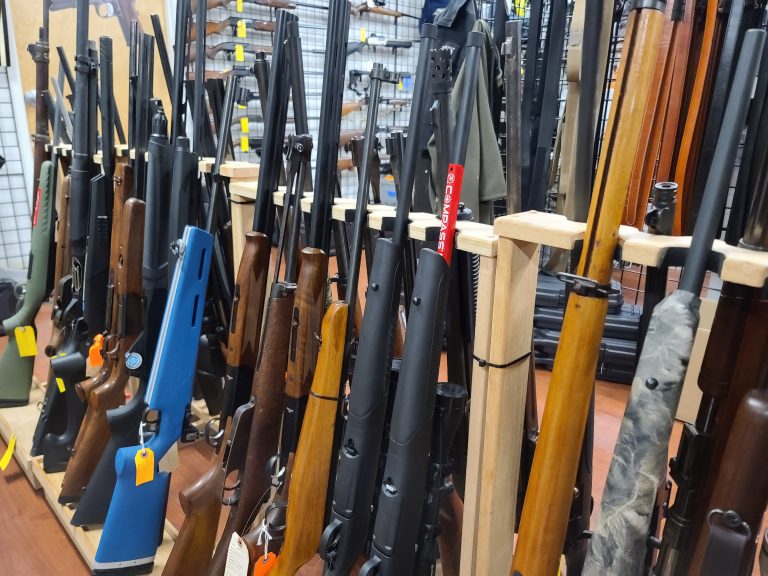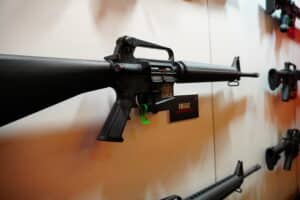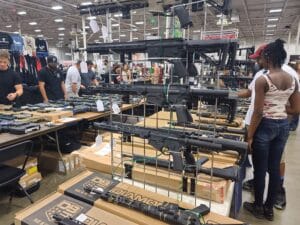New York Governor Kathy Hochul (D.) signed a sweeping collection of new gun restrictions on Monday.
The package includes laws that raise the age requirement to purchase rifles like the AR-15, confiscate magazines that hold more than ten rounds, tighten red flag laws, and restrict civilian purchases of bullet-resistant armor. One of the laws also requires social media to respond to potential threats. Another law mandates microstamping for handguns, a theoretical gun-tracking technology.
“This comprehensive package will close loopholes, give law enforcement the tools they need to prevent easy access to guns, and stop the sale of dangerous weapons to 18-year-olds,” Hochul said on Monday.
New York legislators passed the ten bills that comprise this gun-control package weeks after an 18-year-old allegedly used an AR-15-style rifle to kill ten people at a supermarket in Buffalo. The legislation is the most restrictive that the state has seen and will significantly impact local gun owners while also setting a precedent for gun control around the country.
The state assembly and senate passed the bills Friday in the final minutes of the legislative season. Speaker of the New York State Assembly Carl Heastie (D.), New York State Senate Majority Leader Andrea Stewart-Cousins (D.), New York Attorney General Letitia James (D.), and victims of gun violence joined Hochul’s signing event on Monday.
“Thoughts and prayers won’t fix it, but this will,” the governor said.
The microstamping measure requires all handguns to have a component that imprints a unique identifier on every shell casing for it to be sold inside the state once a state’s division of criminal justice services determines the technology is viable. But no manufacturer in the world currently produces any guns with microstamping capabilities. So, New York dealers would be barred from selling any handguns at all if the microstamping mandate goes into effect.
California is the only other state that has implemented a similar law. State officials have approved zero new handgun models for sale since they deemed the technology viable in 2013. The New York law goes further than California, though, since older handgun models without microstamping are still allowed to be sold there.
Legislation S.9113-A/A.10502 expands who can request Extreme Use Protection Orders (EUPO), which allow the state to confiscate firearms from those determined to be a threat to themselves or others. Though the Buffalo shooter may have qualified for an EUPO under the preexisting statute, nothing was filed against him before the shooting.
Another of the bills prohibits civilians who aren’t “engaged in an eligible profession” from buying and selling protective body armor like the kind the shooter used in Buffalo.
The current law in New York already requires civilians to be 21 to obtain a permit to purchase a handgun; however, this new law extends that age restriction to semi-automatic rifles. That puts it among only a handful of other states with similar restrictions, including Florida and Hawaii.
The new laws may face legal challenges from groups such as the Firearms Policy Coalition or National Rifle Association, who see the law as an infringement on the Second Amendment.
The NRA’s Institute for Legislative Action put out a statement decrying the legislation for adding restrictions on gun ownership in a state that already has heavy restrictions in place. The group also slammed the methods Democrats used to rush the bill through the legislature.
“Majority Democrats wouldn’t even entertain school safety amendments offered,” the statement said. “They did nothing with schools. They did nothing with the catch and release bail disaster. They could not even answer simple questions about what the bills actually do, and one bill sponsor did not know what a .22 was. In fact, they seemed annoyed they were even being questioned.”
On the social media front, the legislation requires social media companies to craft a policy to report “hateful content” and creates the “Task Force on Social Media and Violent Extremism.” This task force is designed to study the link between social media and domestic terrorism and investigate what role the companies play in promoting violent extremism.






